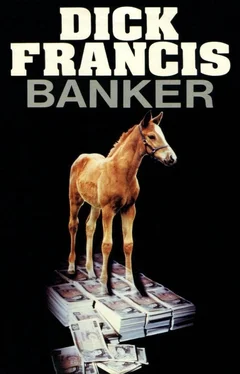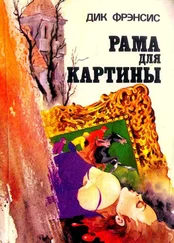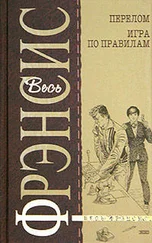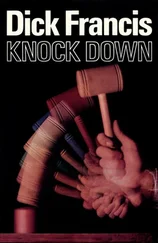‘Those pickers are strictly for opening doors in emergencies,’ the locksmiths said, smiling. ‘If you end up in jail, we don’t know you.’
‘If I end up in jail, send me another set in a fruit cake.’
I thanked them and left, and practised discreetly on the office doors in the bank, with remarkable results. Going home I let myself in through my own front door with them, and locked and unlocked every cupboard and drawer which had a keyhole. Then I put on a dark roll-neck jersey over my shirt and tie and with scant trepidation drove to Newmarket.
I left my car at the side of the road some distance from Calder’s house and finished the journey on foot, walking quietly into his yard in the last of the lingering summer dusk, checking against my watch that it was almost ten o’clock, the hour when Micky Bonwith led his guests to peacock chairs and dug publicly into their psyches.
Calder would give a great performance, I thought: and the regrets I felt about my suspicions of him redoubled as I looked at the outline of his house against the sky and remembered his uncomplicated hospitality.
The reserve which had always at bottom lain between us I now acknowledged as my own instinctive and stifled doubt. Wanting to see worth, I had seen it: and the process of now trying to prove myself wrong gave me more sadness than satisfaction.
His yard was dark and peaceful, all lads long gone. Within the hall of the house a single light burned, a dim point of yellow glimpsed through the bushes fluttering in a gentle breeze. Behind the closed doors of the boxes the patients would be snoozing, those patients with festering sores and bleeding guts and all manner of woes awaiting the touch.
Sandcastle, if I was right, had been destined to stand there, while Calder performed his ‘miracle’ without having to explain how he’d done it. He never had explained: he’d always broadcast publicly that he didn’t know how his power worked, he just knew it did. Thousands, perhaps millions, believed in his power. Perhaps even breeders, those dreamers of dreams, would have believed, in the end.
I came to the surgery, a greyish block in the advancing night, and fitted one of the lock-pickers into the keyhole. The internal tumblers turned without protest, much oiled and used, and I pushed the door open and went in.
There were no windows to worry about. I closed the door behind me and switched on the light, and immediately began the search for which I’d come: to find selenium in home-made capsules, or in a filtering device, or in bottles of shampoo.
Pen had had doubts that anyone would have risked giving selenium a second year if the first year’s work had proved so effective, but I’d reminded her that Sandcastle had already covered many new mares that year before the deformed foals had been reported.
‘Whoever did it couldn’t have known at that point that he’d been successful. So to make sure, I’d guess he’d go on, and maybe with an increased dose... and if no selenium was being given this year, why did Ginnie have it? ’
Pen had reluctantly given in. ‘I suppose I’m just trying to find reasons for you not to go to Calder’s.’
‘If I find anything, Chief Inspector Wyfold can go there later with a search warrant. Don’t worry so.’
‘No,’ she’d said, and gone straight on looking anxious.
The locked cabinets at both ends of Calder’s surgery proved a doddle for the picks, but the contents were a puzzle, as so few of the jars and boxes were properly labelled. Some indeed had come from commercial suppliers, but these seemed mostly to be the herbs Calder had talked of: hydrastis, comfrey, fo-ti-tieng, myrrh, sarsaparilla, liquorice, passiflora, papaya, garlic; a good quantity of each.
Nothing was obligingly labelled selenium.
I had taken with me a thickish polythene bag which had a zip across one end and had formerly enclosed a silk tie and handkerchief, a present from my mother at Christmas. Into that I systematically put two or three capsules from each bottle, and two or three pills of each sort, and small sachets of herbs: and Pen, I thought, was going to have a fine old time sorting them all out.
With the bag almost half full of samples I carefully locked the cabinets again and turned to the refrigerator, which was of an ordinary domestic make with only a magnetic door fastening.
Inside there were no bottles of shampoo. No coffee filters. No linseed oil. There were simply the large plastic containers of Calder’s cure-all tonic.
I thought I might as well take some to satisfy Pen’s curiosity, and rooted around for a small container, finding some empty medicine bottles in a cupboard below the work bench. Over the sink I poured some of the tonic into a medicine bottle, screwed on the cap, and returned the plastic container carefully to its place in the fridge. I stood the medicine bottle on the workbench ready to take away, and turned finally to the drawers where Calder kept things like hops and also his antique pill-making equipment.
Everything was clean and tidy, as before. If he had made capsules containing selenium there, I could see no trace.
With mounting disappointment I went briefly through every drawer. Bags of seeds: sesame, pumpkin, sunflower. Bags of dried herbs, raspberry leaves, alfalfa. Boxes of the empty halves of gelatin capsules, waiting for contents. Empty unused pill bottles. All as before: nothing I hadn’t already seen.
The largest bottom drawer still contained the plastic sacks of hops. I pulled open the neck of one of them and found only the expected strong-smelling crop: closed the neck again, moving the bag slightly to settle it back into its place, and saw that under the bags of hops lay a brown leather briefcase, ordinary size, six inches deep.
With a feeling of wasting time I hauled it out onto the working surface on top of the drawers, and tried to open it.
Both catches were locked. I fished for the keys in my trousers pocket and with the smallest of the picks delicately twisted until the mechanisms clicked.
Opened the lid. Found no bottles of dog shampoo, but other things that turned me slowly to a state of stone.
The contents looked at first sight as if the case belonged to a doctor: stethoscope, pen torch, metal instruments, all in fitted compartments. A cardboard box without its lid held four or five small tubes of antibiotic ointment. A large bottle contained only a few small white pills, the bottle labelled with a long name I could scarcely read, let alone remember, with ‘diuretic’ in brackets underneath. A pad of prescription forms, blank, ready for use.
It was the name and address rubber-stamped onto the prescription forms and the initials heavily embossed in gold into the leather beneath the case’s handle which stunned me totally.
I.A.P. on the case.
Ian A. Pargetter on the prescriptions.
Ian Pargetter, veterinary surgeon, address in Newmarket.
His case had vanished the night he died.
This case...
With fingers beginning to shake I took one of the tubes of antibiotics and some of the diuretic pills and three of the prescription forms and added them to my other spoils, and then with a heart at least beating at about twice normal speed checked that everything was in its place before closing the case.
I felt as much as heard the surgery door open, the current of air reaching me at the same instant as the night sounds. I turned thinking that one of Calder’s lads had come on some late hospital rounds and wondering how I could ever explain my presence; and I saw that no explanation at all would do.
It was Calder himself crossing the threshold. Calder with the light on his curly halo, Calder who should have been a hundred miles away talking to the nation on the tube.
Читать дальше




